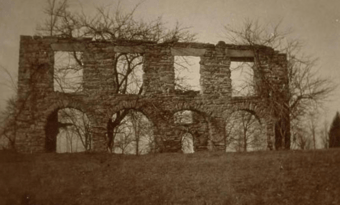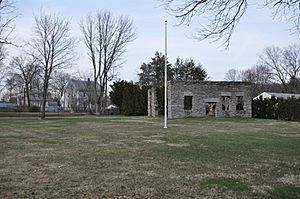Pitkin Glassworks Ruin facts for kids
Quick facts for kids |
|
|
Pitkin Glassworks Ruin
|
|

Ruins, c. 1892
|
|
| Location | Putnam and Parker Sts., Manchester, Connecticut |
|---|---|
| NRHP reference No. | 79002628 |
| Added to NRHP | May 9, 1979 |
The Pitkin Glassworks Ruin is an old factory site in Manchester, Connecticut. It's a special place because it holds the remains of one of the very first glass factories in New England. This factory started way back in 1783. Today, it is recognized as a historic site and was added to the National Register of Historic Places in 1979.
Contents
A Look Back in Time: The Pitkin Glass Factory
The Pitkin Glass Factory began when the area was still part of East Hartford, Connecticut. It was first known as the East Hartford Glass Works.
William and Elisha Pitkin were brothers who helped the American side during the American Revolutionary War. They supplied gunpowder but lost money doing it. To make up for their losses, they asked the state in 1783 for a special deal. They wanted the only right to make glass in the area.
The state agreed and gave them a 25-year monopoly. This meant no one else could make glass there for 25 years once their factory started. The factory opened a few years later. However, it soon ran into money problems. They tried to raise funds through lotteries, but the factory finally closed in 1830.
What They Made at the Factory
The factory mostly made items from green glass. They produced large glass bottles called demijohns for trading with places like the West Indies. They also made many useful containers for everyday life. These included inkwells, pitchers, and bowls. It's not clear if they also made window glass.
Saving the Pitkin Glassworks Ruins
The remains of the old factory are on what used to be the Pitkin family farm. Today, this spot is at the corner of Putnam and Parker Streets. There's a grassy area between the two streets. A sign there tells you it was once the site of the Pitkin Tavern. You can still see parts of the factory's stone walls and other old remains.
In 1928, the Pitkin family gave the ruined factory site to the Daughters of the American Revolution (DAR). The DAR is a group focused on American history.
By 1977, the DAR found it too expensive to keep up the property. They thought about selling the land for new buildings. To stop this, a group of citizens came together. This group included members of the DAR and the Manchester Historical Society. They worked to save the historic site.
Exploring the Past: Archaeological Digs
People have done several archaeological digs at the site. This is when experts carefully dig to find old objects and learn about the past. Students from Central Connecticut State University even helped with one of these digs.
You can see some of the items found and learn more about the factory's history. These displays are at the Old Manchester Museum on Cedar Street.
 | Jackie Robinson |
 | Jack Johnson |
 | Althea Gibson |
 | Arthur Ashe |
 | Muhammad Ali |


